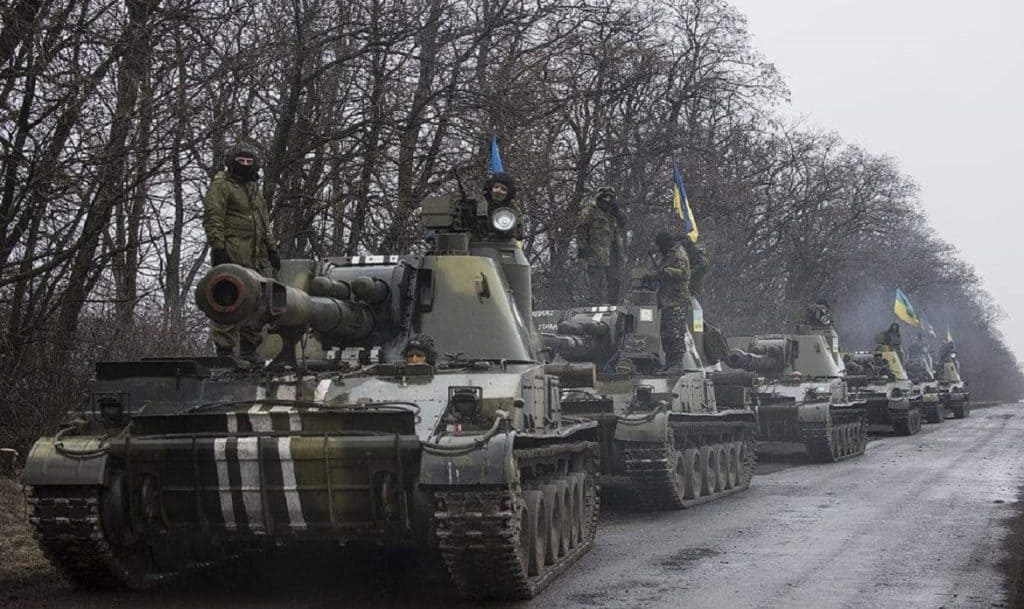By Nikola Mikovic
The Donbass conflict between Russia-backed self-proclaimed Donetsk People’s Republic and Lugansk People’s Republic on the one side, and the West-sponsored Ukraine on the other side could turn into a hot war in the foreseeable future.

Strongly motivated by recent Azerbaijan’s military successes in Nagorno-Karabakh, Ukrainian leaders could try to implement the same strategy in restoring the country’s sovereignty over the territory that has been under de facto Russian control since 2014.
Azerbaijan was waiting for 26 years to raise its flag in places such as Hadrut, Fuzuli, Zangilan and Qubadli. In the meantime, Baku was actively preparing for a potential war and never agreed with the status quo on the ground where Armenian forces formed an unrecognized state called the Republic of Artsakh. Ukraine also never recognized the incorporation of Crimea into the Russian Federation, nor the current status of the self-proclaimed Donbass republics. Instead, it is modernizing its armed forces and is waiting for the right moment to return at least some portion of the Donbass. Given that Crimea has been heavily integrated into the Russian Federation, any attempts to restore Ukrainian sovereignty over the peninsula would mean a direct war with Russia which, at least at this point, does not seem very probable. On the other hand, Ukrainian President Volodymyr Zelensky recently said that his country plans to construct two naval bases in Black Sea which, according to the Kremlin spokesman Dmitry Peskov may have rather negative consequences for stability in the Black Sea region. Still, given that Russia effectively lost control over Ukraine in 2014, apart from expressing concerns there is nothing Russia can do to prevent such actions.
According to some reports, Ukraine plans to purchase up to 48 Bayraktar unmanned aerial vehicles (UAVs), Turkey’s domestically made combat drones that proved to be very efficient during the Azerbaijan – Armenia conflict over Nagorno-Karbakh. There are indications that Ukraine and Turkey could deepen their defense partnership in an effort to counterbalance Russia’s dominance in the Black Sea region. Besides Turkey, the United Kingdom is also included in the process of modernization of the Ukrainian Armed Forces. The UK recently led a multinational Maritime Training Initiative for the Ukrainian Navy, boosting their ability to combat threats in the Black Sea. Since Kiev lost much of its navy capability, after Moscow incorporated Crimea into the Russian Federation in 2014, any potential confrontation with Russia in the Black Sea would likely lead to another Ukrainian defeat. That is why Ukraine is trying to strengthen its Navy and its combat capacities. The UK is playing an important role in this process. Since the training mission began in 2015, British troops have trained over 18,000 members of the Ukrainian military. Ukrainian officials suggest that the UK is also willing to provide a large lethal weapons contract to Ukraine and a £1bn loan to help Ukraine’s navy build new ships capable of use in the Black Sea.
It is worth noting that last year the Trump administration has reportedly approved the $39 million sale of defensive lethal weapons to Ukraine. The new package will include Javelin anti-tank weapons, with one U.S. official saying it includes 150 missiles and two launchers. Also, according to American defense officials, the Pentagon will send weapons and other military aid worth $250 million to Ukraine as part of the four-year-old Ukraine Security Assistance Initiative. On the other hand, Alexander Borodai, the chairman of the Russian-based Union of Donbass Volunteers, recently said that he does not see a peaceful resolution of the Donbass conflict, which may suggest that the Kremlin is quite aware that the war in the East of Ukraine could erupt in the near future.
Without open and prompt Russian support – which seems unlikely, since it would result in more anti-Russia sanctions – the self-proclaimed Donbass republic could be defeated by Ukrainian Armed Forces in a matter of weeks. Russian relatively passive position regarding the Nagorno-Karabakh war, and the absence of a direct support to its ally Armenia, may create an impression in Kiev that Moscow will either not intervene at all to protect its proxies in the Donbass, or that its interference will be very limited and delayed, which could allow Ukraine to create a new status quo on the ground.
There are already reports of the mass transportation of equipment to the front-line area, which exceeds the standard military rotation measures. That, however, does not necessarily mean the war will erupt soon, but given that the Minsk peace process did not result in a permanent solution for the Donbass conflict, the future of the region is still quite uncertain. Recently, Russia-sponsored Donbass republics suggested a new “road map” for the conflict regulation. According to the document, the Donbass should gradually reintegrate into Ukraine, and such a process could last until 2050. Given that both, the West and Ukraine firmly insist on an immediate withdrawal of the pro-Russia forces from the region, It is unlikely that Kiev will accept such a proposal, which means that, in the long term, the Donbass could have the same fate as Nagorno-Karabakh.
Author: Nikola Mikovic (Journalist, researcher and analyst based in Serbia. He covers mostly the foreign policies of Russia, Belarus and Ukraine)
(The views expressed in this article belong only to the author and do not necessarily reflect the views of World Geostrategic Insights).
Image Credit: Flickr







